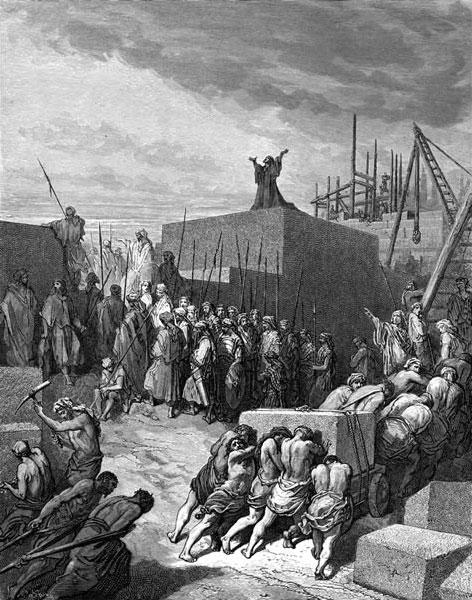Haggai: The Dark House Rises
“God’s word is His presence, when delivered in a true setting.”
by James B. Jordan. Biblical Horizons No. 245
“And hearkened Zerubbabel son of Shealtiel,
and Joshua son of Jehozadak, the great priest,
and all the remnant of the people,
to the voice of Yahweh their God,
and to the words of Haggai the prophet,
just as Yahweh their God had sent him;
and the people feared the presence of Yahweh.
“Then Haggai, the messenger of Yahweh, said
in a message of Yahweh to the people,
saying,
“I am with you — a statement of Yahweh.”
And Yahweh stirred up the spirit of Zerubbabel
son of Shealtiel, governor of Judah,
and the spirit of Joshua son of Jehozadak, the great priest,
and the spirit of all the remnant of the people;
and they came and did work on the house of
Yahweh of Armies, their God,
on the twenty-fourth day
of the sixth month,
in the second year of King Darius.(Haggai 1:12-15)
While it makes for a bit of an awkward English sentence, it is important to see that the first word in verse 12 is “hearkened.” The obedience is instantaneous. We read at the end of the verse that the people feared, or respected, the presence of Yahweh, which in this case means the words of Haggai.
God’s word is His presence, when delivered in a true setting. God had placed his “Name” in the Temple built by Solomon: “My Name shall be there” (1 Kings 8:29). When carried to Babylon, the Levites asked “How can we sing Yahweh’s song in a strange land”; how can we sing the Temple psalms away from the Name in the Temple? (Psalm 137:4). In Psalm 138:2 David gives an answer:
I bow down to Your holy temple,
And I give thanks to Your Name,
For Your lovingkindness and for Your faithfulness,
Because You have magnified Your Word over all Your Name.
Indeed, as David continues in Psalm 139:8, “If I make my bed in Sheol, You are there.” Wherever God’s Word is, His Name-Presence is.
In verse 13, Haggai is called “the messenger of Yahweh.” This is the same word as “Malachi,” My Messenger. It is also the word translated “angel” when referring to spirit-beings. In Genesis 28:12 Jacob saw angels moving between heaven and earth. Similarly, God’s prophets are consulted by Him and carry His words to earth (Amos 3:7; 7:1-8; Genesis 20:7; 18:20-33). In Acts 6:15 the Jews saw the face of Stephen as the face of an angel, which means that when they killed him they were killing God’s messenger, killing the manifestation of God’s very presence in their midst. The Jews should have “feared” the Lord through Stephen as their forefathers had feared Yahweh through Haggai, Yahweh’s messenger/angel.
In verse 9 the “statement of Yahweh” had been one of judgment, but now in verse 13 it is one of blessing. “I am with you” is Immanuel, God With Us, God’s presence among us.
Verse 14 tells us that “not by might, nor by power, but by My Spirit” the Temple is built (Zechariah 4:6). In Zechariah this is the message to Zerubbabel the Davidic Temple-builder. Here it is a blessing to all the people. Interestingly, in Exodus 31 :3ff. it is only Bezalel and some associates of his who are filled with the Spirit to build the Tabernacle. Now in this more glorious time it is all the people who are stirred by the Spirit.
What does this mean for us today? We should consider that before Solomon built the first physical Temple in Jerusalem, a generation earlier David had set up a temple of psalmody around the house(s) of God. (Ark and Tabernacle were separate at this time.) God was enthroned on the praises of His people (Psalm 22:3). Those praises were the psalms.
Uh, yes. The psalms.
In heaven, right now, Jesus is singing the psalms to God the Father. He is not singing metrical paraphrases. He is “chanting” the psalms as they are written.
The gift of tongues is given to the Church to enable us to translate the Bible into all languages, improving those languages over time. We can chant the psalms in English or in any other language in union with Jesus.
So-called “metrical psalms” are fine as sermons based on the psalms, but they are not psalms. You have to be a in a strange mental state to think that they are the same as actual psalms. Anybody with half a brain can tell that they are not.
So, if God’s true temple is a house of music, where is it today? I attended Reformed Theological Seminary in Jackson, Mississippi, and also Westminster Theological Seminary in Philadelphia, Pemisylvania. There was chapel every day. Not once was there any psalm singing. And these places advertised themselves as conservative and orthodox! (Which is some ways they were, but not at this point.) Historically, chanting the psalms along with Jesus has been central to Christian worship. In historic monasteries, all 150 psalms are sung every week!
So Haggai asks us: Is now the time for you to have your 35-inch flat-screen television and your microwave, while the house of God is lifeless and desolate? Do you not care about all the suffering Christians around the world who need you to stand before God during the Lord’s Day and chant the psalms, especially the imprecatory ones? Should you not be building the house of God, that house of prayer and psalms?
Biblical Horizons is published occasionally, funds permitting, by Biblical Horizons, P.O. Box 1096, Niceville, Florida 32588-1096. www.biblicalhorizons.com Anyone sending a donation, in any amount, will be placed on the mailing list to receive issues of Biblical Horizons as they are published.


























